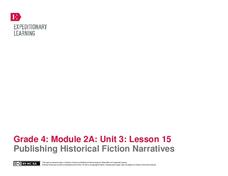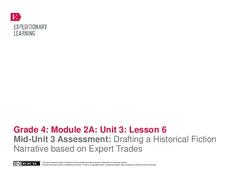EngageNY
Writer's Gallery and End of Unit 3 Assessment: On-Demand New Historical Fiction Narrative
Fourth-grade writers applaud their historical narrative writing pieces through a Writer's Gallery. First, they read an assigned classmate's work and leave a positive comment on a sticky note. Once learners have read a couple of people's...
Oklahoma State Department of Education
Narrative Prompt
Reading about history is nothing like experiencing it firsthand. Encourage your eighth graders to do the next best thing with a historical narrative prompt, in which they describe the experience of a first-time traveler on the...
EngageNY
Practice Planning a Historical Narrative: The Wheelwright
Fourth graders use a four-square graphic organizer to plan a paragraph writing about a wheelwright. Using gathered research from the previous unit, young writers discover how to organize a plot in preparation for writing a historical...
EngageNY
Peer Critique: Historical Accuracy of Ideas and Vocabulary
Promote collaboration in the classroom with a historical fiction instructional activity. Fourth graders partner up and read the other's narrative to give feedback on vocabulary choice and the accuracy of historical information. After...
EngageNY
Writing Dialogue: Revising Historical Narrative Drafts to Add Dialogue
Young writers have written, revised, and peer-edited their historical fiction narratives by the 10th lesson plan in a language arts unit. Fourth graders finally combine their revision notes to create a second draft. The double-spaced...
Houghton Mifflin Harcourt
Writing Prompts for Middle School
Scratching your head when it comes to engaging writing prompts? Check out a list of prompts designed for middle school classes, which includes topics for persuasive writing, expository writing, how-to essays, personal narratives, and...
Curated OER
Daily Writing Prompts April
A great resource that can be used every year during the month of April. This handout includes over 30 writing prompts, one or two for every day in the month of April. Each writing prompt is tailored to its specific day, as they are...
EngageNY
Publishing Historical Fiction Narratives
Class members discover what it means to publish their works. Working on a computer, young writers use an online dictionary to edit their spellings and conventions based on the information added to the rubric. From here, and most of the...
Crafting Freedom
Creating Original Historical Fiction Using Henry "Box" Brown's Narrative and Runaway Slave Ads
Young historians discover the experiences of runaway slaves after reading the brief biography and narrative excerpt of Henry "Box" Brown, who escaped slavery by having himself shipped away in a crate and popularized his flight in a...
EngageNY
Drafting a Historical Fiction Narrative: The Wheelwright
Young writers use the four-square graphic organizer to draft their historical fiction narratives' first, second, third, and fourth paragraphs on the wheelwright. The instructional activity promotes discussion and modeling of what makes a...
Curated OER
Creative Writing - Research and Letters
Here's a fresh approach that combines research, business and personal letter writing, and creative story telling. Student groups research different decades in the life of a famous Japanese astronomer. They then craft a decade fact sheet,...
Curated OER
Reliving History through Slave Narratives
Helpful for an American literature or history unit, this lesson prompts middle schoolers to examine slavery in the United States. They read slave narratives that were part of the Federal Writers' Project and then conduct their own...
Historical Thinking Matters
Rosa Parks: 3 Day Lesson
How can evidence and perspective challenge even the most well-known of stories? Through primary and secondary source analysis, think-alouds, and discussion, young historians evaluate the historical narrative of Rosa Parks across multiple...
Civil War Trust
The Common Civil War Soldier
Imagine you are a soldier in the Civil War. What are you wearing? What do you need to carry with you? Examine the life of a person during the Civil War, from drummer boys to powder monkeys to musket-toting soldiers. Elementary learners...
Curated OER
Lesson: Storyboarding Revolution
Kids consider revolution as a basis for creativity, art, and storytelling. After reading an excerpt from the book, Persepolis, learners choose one event from any world revolution to write about. They storyboard the event focusing on...
Carnegie Library
Creative Writing: Middle School Lesson Plan
Enhance a unit on historical fiction with an engaging writing lesson. Learners bring the Industrial Era to life as they compose their own historical fiction pieces based on primary source images of Pittsburgh steel workers.
EngageNY
Mid-Unit 3 Assessment: Drafting a Historical Fiction Narrative Based on Expert Trades
Young historians use their planning graphic organizer to prepare a personal narrative draft on expert trades. Since the instructional activity is considered the mid-unit assessment, learners respond to a writing prompt related to the...
EngageNY
Preparing to Write Historical Fiction: Determining Characteristics of the Genre
A language arts instructional activity helps young writers identify elements that make up historical fiction. First, it guides them through elements of fictional pieces with vocabulary cards. Then, pupils work collaboratively to...
Crafting Freedom
Sequencing of Events in the Slave Narrative of Henry "Box" Brown
What steps did Henry "Box" Brown take while planning his own escape from slavery? Learners work in groups to analyze segments of Brown's narrative and identify the sequence of the most important events of his story.
Curated OER
"I" Witness to History
Young journalists write diary entries from the point of view of a person involved in a historical event. They focus on including facts, clear narration, and accurate description of the individual's feelings.
Curated OER
Women Call Out: The Personal Narrative
After reading and discussing several personal narratives written by women in the 1920's, class members write a personal narrative of their own about a time in their lives they felt controlled. Sample narratives can be accessed through...
Curated OER
Historical Agency in History Book Sets (HBS)
Study historical events by combining the study of historical fiction and non-fiction. Learners read about true past events in historical fiction novels and then research non-fiction accounts of the same events. What are some differences...
Scholastic
Thomas Jefferson and Monticello: An Introduction to Writing Historical Fiction
Thomas Jefferson is one of the most recognized names and faces in America—but is there more to the third president of the United States? Upper elementary and middle schoolers conduct research on Jefferson, his famous home at Monticello,...
Curated OER
5th Grade Historical Fiction: Solder's Letter
A picture is worth a thousand words, but sometimes a single word can go a long way as well. Practice making inferences about character traits with a letter written from the perspective of a soldier in the American Revolution.

























